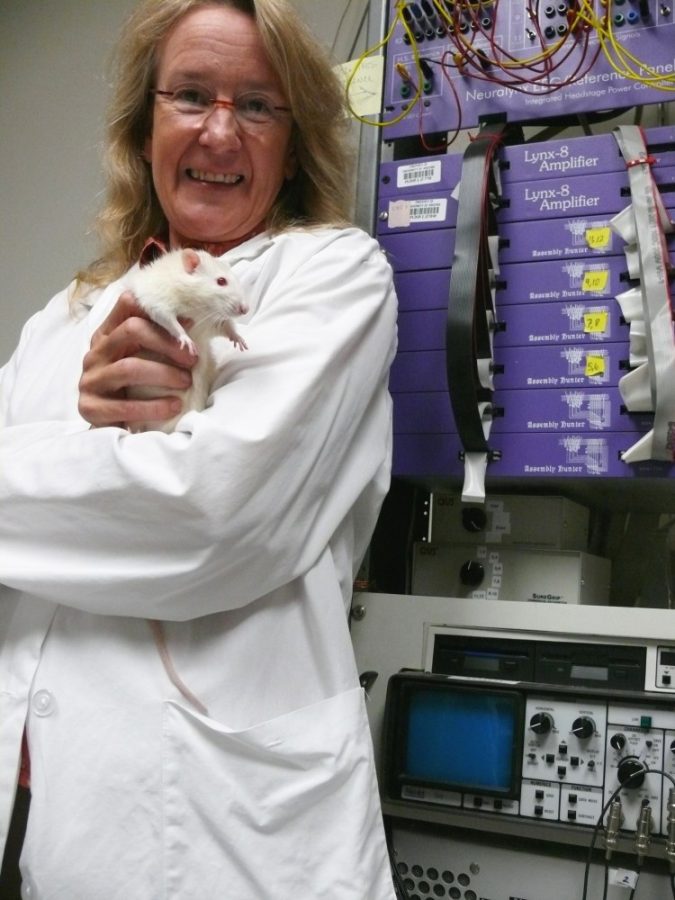Memory loss in old age might seem unavoidable, but not to UA researchers are studying the brain for ways to prevent diseases like Alzheimer’s.
Carol Barnes, associate director of UA’s BIO5 Institute, as well as a Regent’s professor in psychology and neurology, has been researching the brain at the UA for 19 years. In order to understand how Alzheimer’s occurs, Barnes said she focuses on how the brain ages normally.
“”We don’t understand how to avoid it but we do understand a number of things to do to postpone it,”” she said. “”Even if you can have five more years of your memory and yourself, that would be good.””
Barnes and her lab study the cells in the hippocampus, a structure in the temporal lobe that is critical for good memory. In normal aging, there is no cell loss in the hippocampus, but in a brain with Alzheimer’s disease, the cells die, Barnes said.
“”Here at the University of Arizona, we’ve developed methodologies that allow us to record simultaneously from more cells in the brain than almost anybody else in the world,”” she said. “”We can record the activity of many individual brain cells and separate them and look at how the circuits in the aging brain are altered.””
Barnes’ lab works on studies with humans as well as with rats to compare normally aging brains with abnormal ones. She says they’ve developed a method that allows them to look at all of the active memory cells at one time while the animal is having certain experiences.
“”We’ve found a gene marker for experience in the brain so now what we’re trying to do is to see if those animals that successfully age are using those circuits for the different experiences,”” she said.
Barnes hopes that her research can help optimize memory. There are methods that help slow the progression of Alzheimer’s disease, such as consuming antioxidants and even taking ibuprofen, she said.
“”There’s some random evidence out there that another good predictor for having Alzheimer’s disease occur later or never getting it at all is the amount of education you have,”” she said. “”Is it because you’re curious and you use your brain more? Now that’s the million dollar question.””
Barnes and her colleagues have also been developing therapeutic ways of dealing with mild memory loss in old age using a drug called memantine, which is already approved for the treatment of Alzheimer’s disease.
“”We think that that’s quite exciting because we now know that we can specifically affect memory in the aging brain,”” she said. “”It’s not approved for just old everyday memory loss but we’re thinking that perhaps if it’s safe to use, it could be more widely used for people with mild memory loss that you would have during normal aging.””
Randal Scott, an instructional specialist at the Arizona Center on Aging at the UA College of Medicine, said Alzheimer’s disease is a major issue affecting older generations and research is important. “”We have to find solutions,”” he said. “”Watching someone with Alzheimer’s, it’s like minute by minute they disintegrate right before your eyes and there’s nothing you can do about it.””
Charles Wylie, a licensed practional nurse at Devon Gables Health Care Center in Tucson, works with residents that have Alzheimer’s disease and thinks more advances are necessary to try and prevent it.
“”They start out forgetting little things and it increasingly gets worse,”” he said. “”Towards the end, they even forget how to eat.””
He also said the residents can get combative or agitated because they’ve forgotten something.
Barnes knows that her research has helped, but she wants to make the next leap.
“”I’m not interested in extending life span,”” she said. “”To me, you are your memory, and there’s nothing worse than seeing someone with Alzheimer’s disease who’s completely robbed of their memory; they’re robbed of themselves.””









